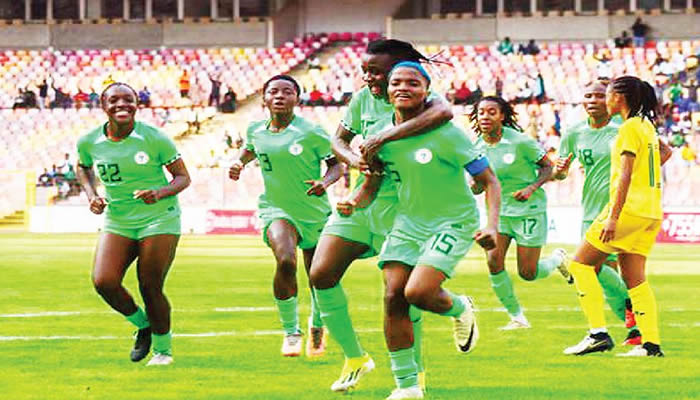Nigeria’s Super Falcons, the reigning champions of African women’s football, concluded their Group B campaign at the 2024 Women’s Africa Cup of Nations (WAFCON) with a goalless draw against Algeria. Despite the stalemate, the Falcons soared to the top of the group standings, preserving their unbeaten streak in the tournament and securing a spot in the quarter-finals. The match, played at the Larbi Zaouli Stadium in Casablanca, showcased Nigeria’s dominance in possession and chance creation, but their finishing touch faltered against a resolute Algerian defense. The result marked a departure from their usual group stage finale victories, yet solidified their defensive prowess as they progressed without conceding a single goal.
Entering the match having already secured qualification with victories over Tunisia and Botswana, Coach Randy Waldrum made strategic changes to the starting lineup, providing opportunities for squad players and resting key figures for the upcoming knockout stages. The Falcons dictated the tempo from the outset, pinning Algeria deep within their own half. Rasheedat Ajibade and Francisca Ordega orchestrated early attacks, testing the Algerian defense, while Chinwendu Ihezuo, in her first start of the tournament, came close to breaking the deadlock. Despite the relentless pressure and a barrage of corner kicks, Nigeria’s finishing lacked the precision needed to convert their dominance into goals.
Algeria’s goalkeeper, Chloé N’Gazi, emerged as a pivotal figure for her team, showcasing exceptional reflexes and shot-stopping abilities. N’Gazi repeatedly thwarted Nigeria’s attempts, including a crucial save in stoppage time to deny Esther Okoronkwo’s powerful header. Algeria’s tactical approach revolved around disciplined defending and absorbing pressure, effectively neutralizing Nigeria’s attacking threats. Although they registered no shots on target throughout the match, their defensive resilience proved sufficient to earn a valuable point.
The second half witnessed a similar pattern, with Nigeria continuing to dominate possession and create opportunities. Substitutes Omorinsola Babajide and Folashade Ijamilusi injected pace and width into the attack, while Joe Echegini’s long-range effort in the 87th minute narrowly missed the target. Despite the sustained pressure and near misses, Nigeria’s profligacy in front of goal persisted, and the match ultimately ended in a goalless draw.
The draw against Algeria marked the first time Nigeria failed to win their final group stage match at the WAFCON, ending a streak of 12 consecutive victories in such fixtures dating back to their debut in the tournament in 1998. However, their defensive solidity remained a hallmark of their campaign. The Falcons completed the group stage without conceding a goal, a feat they had only achieved once before, in the inaugural tournament in 1998. The impressive defensive record underscores their strength at the back and bodes well for their prospects in the knockout rounds.
Finishing atop Group B with seven points, four goals scored, and none conceded, Nigeria secured a quarter-final clash against Zambia, a rematch of the third-place playoff from the 2022 edition, which Nigeria lost 1-0. This year’s tournament marks the 13th time the Super Falcons have qualified for the knockout stage, having achieved this feat in every edition they have participated in. Their consistent presence in the latter stages of the competition underscores their status as a dominant force in African women’s football. While the draw against Algeria highlighted areas for improvement in their finishing, their unbeaten run, defensive solidity, and group-leading performance provide a strong foundation as they embark on the knockout stages and aim to retain their WAFCON title.


